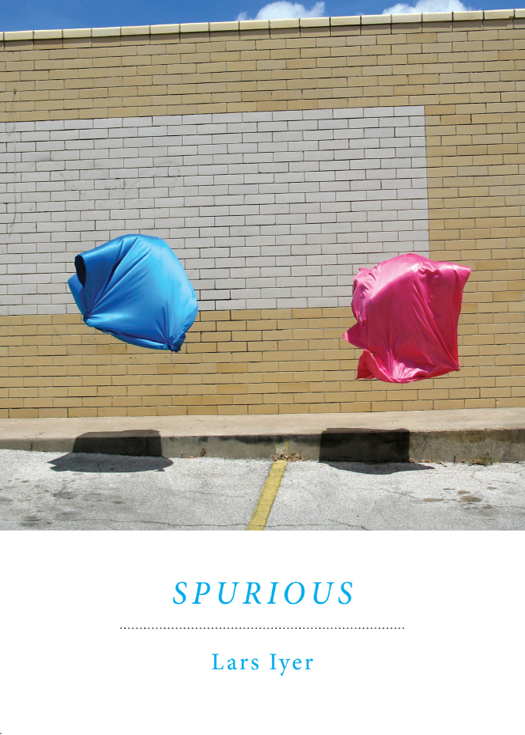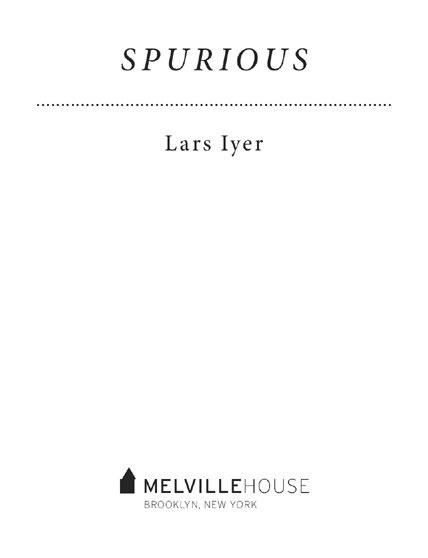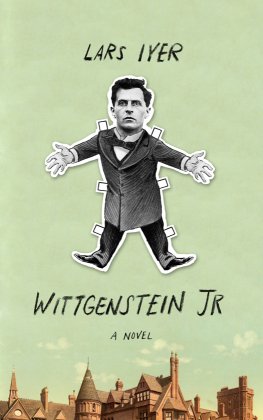Lars Iyer - Spurious
Here you can read online Lars Iyer - Spurious full text of the book (entire story) in english for free. Download pdf and epub, get meaning, cover and reviews about this ebook. year: 2011, publisher: Melville House, genre: Humor. Description of the work, (preface) as well as reviews are available. Best literature library LitArk.com created for fans of good reading and offers a wide selection of genres:
Romance novel
Science fiction
Adventure
Detective
Science
History
Home and family
Prose
Art
Politics
Computer
Non-fiction
Religion
Business
Children
Humor
Choose a favorite category and find really read worthwhile books. Enjoy immersion in the world of imagination, feel the emotions of the characters or learn something new for yourself, make an fascinating discovery.

Spurious: summary, description and annotation
We offer to read an annotation, description, summary or preface (depends on what the author of the book "Spurious" wrote himself). If you haven't found the necessary information about the book — write in the comments, we will try to find it.
Lars Iyer: author's other books
Who wrote Spurious? Find out the surname, the name of the author of the book and a list of all author's works by series.
Spurious — read online for free the complete book (whole text) full work
Below is the text of the book, divided by pages. System saving the place of the last page read, allows you to conveniently read the book "Spurious" online for free, without having to search again every time where you left off. Put a bookmark, and you can go to the page where you finished reading at any time.
Font size:
Interval:
Bookmark:


SPURIOUS
Copyright 2011 by Lars Iyer
All rights reserved
Melville House Publishing
145 Plymouth Street
Brooklyn, New York 11201
mhpbooks.com
The Library of Congress has cataloged the paperback edition as follows:
Iyer, Lars.
Spurious : a novel / Lars Iyer.
p. cm.
eISBN: 978-1-935554-92-9
I. Title.
PR6109.Y47S78 2011
823.92--dc22
2010038113
v3.1
To Sinad
Im a terrible influence on W., everyone says that. Why does he hang out with me? Whats in it for him? The great and the good are shaking their heads. Sometimes W. goes back to the high table and explains himself. I am something to explain, W. says. He has to account for me to everyone. Why is that?
I dont feel I have to account for myself, W. says, thats what it is. Ive no real sense of shame. It must be something to do with my Hinduism, W. muses.Youre an ancient people, but an innocent one, unburdened by shame, W. says. On the other hand, it could be simply due to my stupidity. Im freer than him, W. acknowledges, but more stupid. Its an innocent kind of stupidity, but its stupidity nonetheless.
Its been my great role in his life, W. says, helping him escape the high table. Hes down among the low tables now, he says, in the chimps enclosure.
W. remembers when I was up and coming, he tells me. He remembers the questions I used to ask, and how they would resound beneath the vaulted ceilings.You seemed so intelligent then, he says. I shrug. But when any of us read your work , he says, without finishing the sentence.
So was he ever up and coming?, I ask W. He was, he remembers. That was a golden age. Everyone looked up to him. Everything was expected of him! Each morning, he got up and read and took notes until he went to bed. He had a desk and a bed in his room, and his books and his notebooks, but nothing else. He didnt go out, didnt drink, but just read and took notes, day after day. What went wrong?Drinking, he says. I drank too much, I smoked too much. Why did he drink?The sense of the apocalypse, W. says. That it was all for nothing.
W. is impressed by my stammer.You stammer and stutter, says W., and you swallow half your words. Whats wrong with you? Every time I see him, he says, it gets a little worse. The simplest words are beginning to defeat me, W. says. Maybe its mini-strokes, W. speculates. That would account for it.You had one just there, didnt you?
Perhaps, W. muses, my stammering and stuttering is a sign of shame. W. says he never really thought I was capable of it, shame, but perhaps its there nonetheless.Something inside you knows you talk rubbish, he says. Something knows the unending bilge that comes out of your mouth.
Something inside you always knew, didnt it?, W. says. Didnt your teachers say as much on your report card: Larshas a stutter, but it doesnt seem to bother him? But why was I unbothered?, W. wonders. Did I imagine that my shame should end with the sign of my shame? I wasnt ashamed of my shame, thats the point, W. says. My shame didnt prompt me to thought and reflection. It didnt make me change my ways.
Its all down to my non-Catholicism and non-Judaism, W. says. Only for a Jew and a Catholic like himself (W.s family are converts), is it possible to feel shame about shame.
W. dreams of serious conversation. Not that it would have serious topics, you understand, he saysthat it would be concerned, for example, with the great topics of the day.Speech itself would be serious, he says with great vehemence. Thats what hes found with the real thinkers hes known. Everything they say is serious; theyre incapable of being unserious.
Even I become serious when a real thinker is about, W.s observed. We remember that afternoon in Greenwich when W. was lost in conversation with one such thinker. I was leaning in, trying to listen; I had a sense of the seriousness of the conversation, W. could see it. He was impressed; for once I wasnt going to ruin it by talking about blowholes or something.
Conversation!, exclaims W. Thats what friendships all about. He thinks even I have a sense of that.Its why you stammer, says W. Its why you swallow half of your words.
When did you know?, W. says with great insistence. When did you know you werent going to amount to anything? Did you know?, he asks, because sometimes he suspects I never did. Well he knows, at any rate, for both of us.Neither of us is going to amount to anything!, he says with finality. Neither of us! Anything!
W. speaks mournfully about my intellectual decline. Of course its not my decline he laments, but that of his own judgement, and his own fantastic hopes: how was it that he placed them in me? Why did he need to place them in anyone at all?
Hows it come to this?, W. says. What wrong turn did he make? He was like Dante, he says, lost in a dark forest.And there you were, he says, the idiot in the forest. I was always lost, wasnt I? I didnt even know I was lost, but I was lost. Or perhaps I was never lost. Perhaps I belonged in the forest, W. muses. Perhaps I am only that forest where W. is wandering, he says, hes not sure.
Do you think its possible to die of stupidity? W. sighs. Not as a consequence of that stupidity, he notes, but from stupidity. And shame, W. asks me, do you think you could die of shame, I mean literally die?
We should hang ourselves immediately, W. thinks, its the only honourable course of action. We are compromised, utterly compromised.
Things are bad. We should kill ourselves, W. says. Hes thought of setting himself on fire before a crowd like that madman in Tarkovskys film.Not that it would do any good, he says.
Early morning at the airport.Beer, W. commands. You can pay for this.
Were always renewed, W. says., when we set off once again to speak in Europe. Always young and uncowed, full of fresh hope and new happiness, toasting each other in foreign countries and falling down drunk in foreign gutters. Are we really that shameless?, W. wonders. But perhaps it doesnt matter whether were shameless or not: well do exactly the same thing anyway and will be eternally surprised at the rediscovery of our own idiocy.
But are we really that innocent?, W. wonders. Dont we, at one level or another, know our own idiocy? Doesnt it saturate our awareness to the extent that we know nothing else? But by some miracle, we always regain just enough innocence, just enough forgetting for it all to begin again.
What have I told you!, says W. as we board the train in Frankfurt. This is public space. Pub-lic. That means outside your head. He points to my head. Private. And then out to the world. Public.
W. is a great upholder of this division. Abolish the public/private divide and you abolish civilisation, W. always says. He looks around him contentedly.See how quiet it is in Europe? Its civilised, he says, not like you.
Europe makes him gentler, better, W. says. It improves him. Its the public spaces, he says. Theyre so quiet in Germany. So calm.
Later, and W. is in a contemplative mood. Is he thinking of his Canadian boyhood? No, W. is thinking of his many European trips. Hes been back and forth across Europe, back and forth W.s travelled. Not like me.You havent been anywhere. Its obvious.
W. is an experienced traveller. Take drinking, for example. He can pace himself, he says. Morning to night, he drinks like a European. Steadily. Thats the secret. You should watch the Poles, he says, theyre experts.
Font size:
Interval:
Bookmark:
Similar books «Spurious»
Look at similar books to Spurious. We have selected literature similar in name and meaning in the hope of providing readers with more options to find new, interesting, not yet read works.
Discussion, reviews of the book Spurious and just readers' own opinions. Leave your comments, write what you think about the work, its meaning or the main characters. Specify what exactly you liked and what you didn't like, and why you think so.









